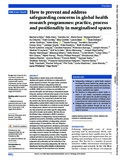| dc.contributor.author | Aktar, Bachera | |
| dc.contributor.author | Alam, Wafa | |
| dc.contributor.author | Ali, Samiha | |
| dc.contributor.author | Awal, Abdul | |
| dc.contributor.author | Bayoh, Margaret | |
| dc.contributor.author | Chumo, Ivy | |
| dc.contributor.author | Contay, Yirah | |
| dc.contributor.author | Conteh, Abu | |
| dc.contributor.author | Dean, Laura | |
| dc.contributor.author | Dobson, Skye | |
| dc.contributor.author | Edstrom, Jerker | |
| dc.contributor.author | Elsey, Helen | |
| dc.contributor.author | Farnaz, Nadia | |
| dc.contributor.author | Garimella, Surekha | |
| dc.contributor.author | Gray, Linsay | |
| dc.contributor.author | Gupte, Jaideep | |
| dc.contributor.author | Hawkins, Kate | |
| dc.contributor.author | Hollihead, Beth | |
| dc.contributor.author | Josyula, Kunhi Lakshmi | |
| dc.contributor.author | Kabaria, Caroline | |
| dc.contributor.author | Karuga, Robinson | |
| dc.contributor.author | Kimani, Joseph | |
| dc.contributor.author | Leyland, Alastair H | |
| dc.contributor.author | te Lintelo, Dolf | |
| dc.contributor.author | Mansaray, Bintu | |
| dc.contributor.author | MacCarthy, Joseph | |
| dc.contributor.author | MacGregor, Hayley | |
| dc.contributor.author | Mberu, Blessing | |
| dc.contributor.author | Muturi, Nelly | |
| dc.contributor.author | Okoth, Linet | |
| dc.contributor.author | Otiso, Lilian | |
| dc.contributor.author | Ozano, Kim | |
| dc.contributor.author | Parray, Ateeb | |
| dc.contributor.author | Phillips-Howard, Penny | |
| dc.contributor.author | Rao, Vinodkumar | |
| dc.contributor.author | Rashid, Sabina | |
| dc.contributor.author | Raven, Joanna | |
| dc.contributor.author | Refell, Francis | |
| dc.contributor.author | Saidu, Samuel | |
| dc.contributor.author | Sobhan, Shafinaz | |
| dc.contributor.author | Saligram, Prasanna Subramanya | |
| dc.contributor.author | Sesay, Samira | |
| dc.contributor.author | Theobald, Sally | |
| dc.contributor.author | Tolhurst, Rachel | |
| dc.contributor.author | Tubb, Phil | |
| dc.contributor.author | Waldman, Linda | |
| dc.contributor.author | Wariutu, Jane | |
| dc.contributor.author | Whittaker, Lana | |
| dc.contributor.author | Wurie, Haja | |
| dc.date.accessioned | 2022-05-11T05:23:54Z | |
| dc.date.available | 2022-05-11T05:23:54Z | |
| dc.date.copyright | 2020 | |
| dc.date.issued | 2020-05-13 | |
| dc.identifier.citation | Aktar, B., Alam, W., Ali, S., Awal, A., Bayoh, M., Chumo, I., . . . Wurie, H. (2020). How to prevent and address safeguarding concerns in global health research programmes: Practice, process and positionality in marginalised spaces. BMJ Global Health, 5(5) doi:10.1136/bmjgh-2019-002253 | en_US |
| dc.identifier.uri | http://hdl.handle.net/10361/16590 | |
| dc.description | This article was published in BMJ Global Health by BMJ Journals [ © Author(s) (or their employer(s)) 2020. Re-use permitted under CC BY. Published by BMJ.] and the definite version is available at: http://dx.doi.org/10.1136/bmjgh-2019-002253 The Journal's website is at: https://gh.bmj.com/content/5/5/e002253 | en_US |
| dc.description.abstract | Safeguarding is rapidly rising up the international
development agenda, yet literature on safeguarding in
related research is limited. This paper shares processes
and practice relating to safeguarding within an
international research consortium (the ARISE hub, known
as ARISE). ARISE aims to enhance accountability and
improve the health and well-being of marginalised people
living and working in informal urban spaces in low-income
and middle-income countries (Bangladesh, India, Kenya
and Sierra Leone). Our manuscript is divided into three
key sections. We start by discussing the importance of
safeguarding in global health research and consider how
thinking about vulnerability as a relational concept (shaped
by unequal power relations and structural violence)
can help locate fluid and context specific safeguarding
risks within broader social systems. We then discuss
the different steps undertaken in ARISE to develop a
shared approach to safeguarding: sharing institutional
guidelines and practice; facilitating a participatory process
to agree a working definition of safeguarding and joint
understandings of vulnerabilities, risks and mitigation
strategies and share experiences; developing action plans
for safeguarding. This is followed by reflection on our key
learnings including how safeguarding, ethics and health
and safety concerns overlap; the challenges of referral
and support for safeguarding concerns within frequently
underserved informal urban spaces; and the importance
of reflective practice and critical thinking about power,
judgement and positionality and the ownership of the
global narrative surrounding safeguarding. We finish by
situating our learning within debates on decolonising
science and argue for the importance of an iterative,
ongoing learning journey that is critical, reflective and
inclusive of vulnerable people. | en_US |
| dc.language.iso | en_US | en_US |
| dc.publisher | BMJ Journals | en_US |
| dc.relation.uri | https://gh.bmj.com/content/5/5/e002253 | |
| dc.subject | Safeguarding concerns | en_US |
| dc.subject | Global health research programmes | en_US |
| dc.title | How to prevent and address safeguarding concerns in global health research programmes: Practice, process and positionality in marginalised spaces | en_US |
| dc.type | Journal Article | en_US |
| dc.description.version | Published | |
| dc.contributor.department | Brac James P. Grant School of Public Health | |
| dc.identifier.doi | http://dx.doi.org/10.1136/bmjgh-2019-002253 | |
| dc.relation.journal | BMJ Global Health | |

